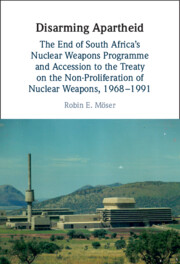 Disarming Apartheid
Disarming Apartheid Book contents
- Disarming Apartheid
- Reviews
- Disarming Apartheid
- Copyright page
- Dedication
- Contents
- Figures
- Acknowledgements
- Abbreviations
- Introduction
- 1 The Development of Pretoria’s Nuclear Industry and Relations with the IAEA, 1950–1977
- 2 Towards Nuclear Weapons – Away from Safeguards
- 3 Nuclear Diplomacy
- 4 Towards the End of South Africa’s Nuclear Weapons and NPT Negotiations, 1988–1989
- 5 South African Movement towards NPT Signature, 1990–1991
- 6 Post-NPT Accession
- Conclusion
- Bibliography
- Index
6 - Post-NPT Accession
Champion of Non-proliferation Norms – Or Recalcitrant Proliferation Hotspot?
Published online by Cambridge University Press: 28 March 2024
- Disarming Apartheid
- Reviews
- Disarming Apartheid
- Copyright page
- Dedication
- Contents
- Figures
- Acknowledgements
- Abbreviations
- Introduction
- 1 The Development of Pretoria’s Nuclear Industry and Relations with the IAEA, 1950–1977
- 2 Towards Nuclear Weapons – Away from Safeguards
- 3 Nuclear Diplomacy
- 4 Towards the End of South Africa’s Nuclear Weapons and NPT Negotiations, 1988–1989
- 5 South African Movement towards NPT Signature, 1990–1991
- 6 Post-NPT Accession
- Conclusion
- Bibliography
- Index
Summary
Chapter 6 bridges the gap between the apartheid years and the post-apartheid majority government under ANC rule. Following the signature of the Treaty on the Non-Proliferation of Nuclear Weapons (NPT), the saga of South Africa’s nuclear weapons programme was far from over, as the government still had to conclude a comprehensive safeguards agreement with the International Atomic Energy Agency (IAEA). I illuminate how the nuclear sector inherited from the apartheid era was scaled down under the first democratic government. In addition, yet another leftover from the apartheid past continued to make headlines well into the second decade of the new millennium: the highly enriched uranium (HEU) in the hands of the South Africans remained an irritating issue from an US non-proliferation policy point of view. By looking at the government’s nuclear policies under ANC majority rule, I reveal that the Thabo Mbeki and Jacob Zuma administrations were not receptive to US incentives to sell South Africa’s remaining HEU to Washington. However, from the US State Department’s perspective, this could have decreased the danger of proliferation.
Keywords
- Type
- Chapter
- Information
- Disarming ApartheidThe End of South Africa's Nuclear Weapons Programme and Accession to the Treaty on the Non-Proliferation of Nuclear Weapons, 1968–1991, pp. 172 - 195Publisher: Cambridge University PressPrint publication year: 2024
